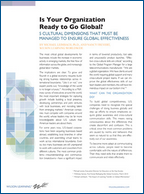Most businesses are ill-equipped to succeed in globally. See how help your leaders and employees become successful on a global level with our training programs.
Why do so many cross-border, cross-cultural initiatives fail?
Research shows 70% of cross-cultural mergers still fail because of cultural differences. Cultivating a global mindset and learning how to bridge cultural barriers is essential, not only across oceans, but also across hallways.
Wilson Learning's Global Effectiveness program raises participants Global Versatility, through building a Global Mindset and Skill Set.
Global Versatility = Mindset + Skill Set
The result? More effective cross-cultural interactions.
A Global Mindset enables us to challenge our perceptions to think, act, and communicate in fundamentally different ways.
A Global Skill Set is a group of tangible tools used to address differences in beliefs, attitudes, values, and stereotypes that often lead to misunderstandings.
Wilson Learning's Global Effectiveness program develops a global skill set across five cultural dimensions based on research by [Geert] Hofstede and [Edward] Hall.
Five Cultural Dimensions
* Task & Relationship
* Power Distance
* Uncertainty Avoidance
* Individualism/Collectivism
* Context Communication
For example, task and relationship focuses on how people prefer to begin an interaction. Task oriented cultures believe business comes first. Socializing comes after the meeting.
A second dimension, uncertainty avoidance examines the extent to which members of a culture are comfortable with risk and uncertainty. Cultures high in uncertainty avoidance prefer rules and constraints designed to reduce risk and are hesitant to allow new ideas. When people from a high uncertainty avoidance culture interact with people from a low uncertainty avoidance culture, misunderstandings can result. Understanding this difference allows for improved versatility and communication.
A third dimension, Individualism/Collectivism explains differences in cultures that are centered on the group or on the individual. If a culture is more we-focused than I-focused, you can improve collaboration by focusing on gaining more consensus.
Working globally with other cultures requires a mindset and a skill set to know how to respond to differences in culture, time, space, and boundaries. The result? Improved interactions and global outcomes.
Let Wilson Learning help prepare your organization to work effectively across cultures.
To learn more, contact Wilson Learning today.
Wilson Learning
800.328.7937
www.WilsonLearning.com








